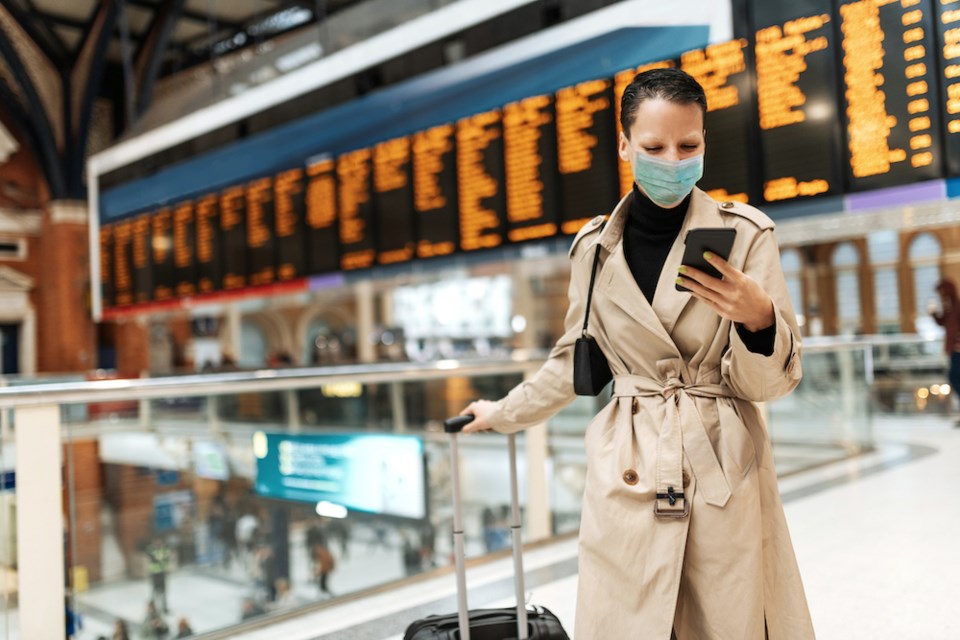The BC Centre for Disease Control (BCCDC) is warning airline passengers they may have been exposed to coronavirus (COVID-19) multiple recent B.C. flights.
On Feb. 11, Vancouver Is Awesome shared 5 new B.C. flights that were added to the list of potential COVID-19 public exposures.
Since then, the following 19 new flights have been added to the BCCDC's list of affected flights:
- Feb. 3, Air Canada Flight 210, Vancouver to Calgary (Rows 22 - 28)
- Feb. 3: Air Canada/Jazz Flight 8550, Vancouver to Regina (Rows 16 - 22)
- Feb. 3: Cathy Pacific 888, Hong Kong to Vancouver (Rows 66 - 72)
- Feb. 3: Air India 185, Delhi to Vancouver (Rows not reported)
- Feb. 6: Air Canada 44, Vancouver to Delhi (Rows not reported)
- Feb. 6: WestJet 139, Calgary to Vancouver (Rows 15 - 21)
- Feb. 6: Air Canada 215, Calgary to Vancouver (Rows not reported)
- Feb. 7: Air Canada 8414, Vancouver to Kelowna (Rows 4 -10)
- Feb. 7: Air Canada 8239, Terrace to Vancouver (Rows 12 - 18)
- Feb. 9: Air Canada 106, Vancouver to Toronto (Rows 18 - 21)
- Feb. 9, Flair Flight 8821, Toronto to Vancouver (Rows 14 - 20)
- Feb. 11: Flair 8101, Vancouver to Toronto (Rows 27 - 33)
- Feb. 10: Air Canada 8550, Vancouver to Regina (Rows 13 - 19)
- Feb. 11: Air Canada 103, Toronto to Vancouver (Rows not reported)
- Feb. 11: Sunwing Airlines 2860, Mexico City to Vancouver (Rows 2 - 8, 10 - 16, and 22 - 28)
- Feb. 11: Air Canada 301, Montreal to Vancouver (Rows not reported)
- Feb. 11: Air Canada 114, Vancouver to Toronto (Rows not reported)
- Feb. 12: Air Canada 306, Vancouver to Montreal (Rows not reported)
- Feb. 12: Air Canada 311, Montreal to Vancouver (Rows not reported)
Any travellers returning to B.C. are encouraged to check the public health agency's website for updates about flights identified for the risk of exposure. Those travelling from outside of Canada, meanwhile, must arrive prepared with a 14-day self-isolation plan.
Things to consider as a Canadian booking travel in 2021
If you're wondering when it will be safe to travel again, you are far from alone.
When it is safe to travel again, there will be several changes to consider. If you've had to fly anywhere recently, you're probably already aware of some of them.
Last month, Transport Minister Marc Garneau issued an Interim Order formalizing the new COVID-19 testing requirements for all air travellers coming into Canada.
Now, everyone entering Canada--by land or air--will need to have proof of a negative laboratory test result for COVID-19.
That said, not all testing facilities are created equal, and you could be denied boarding if you carry a questionable document.
And you could also be fined up to $5,000.
So, before you depart on your next flight, consider the risks involved, and determine if you'll be able to acquire a credible document.
The government will also require entrants to Canada to quarantine in a hotel on arrival, costing them more than $2,000. If travellers test negative for COVID-19 after three days, they will be allowed to quarantine at home, albeit under increased surveillance.
--With files from Tyler Orton.



